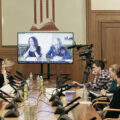The CIS Executive Committee and the Russian State Library held a round table “The Russian language in intercultural communication in the Commonwealth countries”.
On April 19, 2023, the CIS Executive Committee and the Russian State Library held a round table “The Russian language in intercultural communication in the Commonwealth countries”. The event was held within the framework of the Plan to hold the Year of the Russian Language as the Language of Interethnic Communication in 2023, announced by the Council of Heads of State of the CIS on December 18, 2020, during the International Scientific and Practical Conference “Rumyantsev Readings – 2023”. The participants discussed issues of intercultural and interlingual interaction in the CIS countries, as well as the role of humanitarian institutions in the development of international cooperation and in the development of a culture of interethnic communication.
The event was moderated by Svetlana Malinina, Head of the Press Office of the CIS Executive Committee, and Irina Gaishun, Deputy Head of the Foreign LIS and International Relations Department of the RSL.
The event was attended by around 40 experts, including representatives of interstate entities, public and educational organizations, as well as library institutions of neighboring countries.
Ivan Ivanov, Head of the Representative Office of the Federal Agency for the Commonwealth of Independent States, Compatriots Living Abroad, and International Humanitarian Cooperation (Rossotrudnichestvo) in the Republic of Tajikistan, informed the participants of the round table that the Year of the Russian Language in Tajikistan is supported by the President of the country Emomali Rahmon. He also noted that there is a growing interest in receiving education in Russian in Tajikistan, so five new Russian schools were opened in the Republic last year, in Dushanbe as well as in other cities. “At the moment, a major educational event is taking place in the country — a quota initiative for admission to Russian universities. Tajikistan has traditionally been one of the leaders in terms of the number of admissions, this year it stands at 902 quotas, with over 5,000 people willing to get an education in Russia having registered,” noted Ivan Ivanov. Moreover, Chinese developers working in Tajikistan and Afghan refugees in the country show high demand for learning the Russian language.
The exciting speech by Gulnabat Tekayeva (Turkmenistan), Head of the Moscow society of Turkmen culture, was devoted to the interest in the Russian language among children and teenagers in Turkmenistan. She called the Russian language the language of Russian cartoons and the language of communication. Outstanding Turkmen ethnographers and archaeologists wrote their research papers in Russian. Famous Turkmen people from musical, cinematographic and theatrical fields have received education in Russian. “While a few years ago young people sought to study in Turkey or in England, now they prioritize Russian education,” noted Ms. Tekayeva.
Alexander Bochkarev (Russia), Executive Director of the Society for Friendship, Cultural and Business Relations between Russia and Turkmenistan, outlined the interest of Turkmen youth in a wide range of knowledge in the field of Russian language and culture, and the presence of enthusiasts who are ready to settle the issues of humanitarian cooperation.
Participants of the international project “Educational Collaboration of Commonwealth Libraries — 2022”, organized by the Russian State Library together with Rossotrudnichestvo, also made presentations at the round table. The project is part of “New Generation” programme that involves short-term study trips of young representatives of political, public, scientific and business circles of foreign countries to the Russian Federation.
Ekaterina Bogdanova, Chief Librarian of the Library Marketing Department of the Polotsk District Centralized Library System (Belarus), told the audience that the Russian language helps establish personal contacts with colleagues from other CIS countries.
Syrgakbek Dzhaparkulov (Kyrgyzstan), Head of the Computer Center of the Republican Library for Children and Youth named after K. Bayalinov, began his speech with words of gratitude to colleagues from other CIS countries who participated in “Educational Collaboration of Commonwealth Libraries” project. Their professional expertise was useful in creating new programs in the library. Russian is the second official language in the Kyrgyz Republic, and the knowledge of Russian is an important factor for ensuring effective communication both in government institutions and in the business community. The library’s computer center helps children to master new programs, and knowledge of the Russian language enables the specialists to adapt existing and create new modern educational materials that can be later translated into Kyrgyz language. In addition, the Republican Library preserved numerous archival documents in Russian concerning the rich cultural heritage of Kyrgyzstan.
The report by Feruza Almukhamedova, Head of the Foreign Literature Department of the Fergana Regional Information and Library Center named after Ahmad Ferghani (Uzbekistan), was especially informative. Numerous branches of Russian universities have appeared in the cities of Uzbekistan over the last 3-4 years, reaching the total of 15. Representatives of all ethnic groups living in the Republic show great interest in receiving education within the framework of the Russian system. This is largely due to the efforts of specialists from leading Russian universities who carry out their work even in remote areas of Uzbekistan.
The round table was also attended by representatives of the Yeltsin Presidential Library, Saint Petersburg State Institute of Culture, and the Rostov Regional Children’s Library named after V.M.Velichkina. They presented reports on various electronic resources dedicated to the Russian language and activities related to the formation of interethnic unity.
Press office of the Russian State Library
Photo: Maria Govtvan, Russian State Library

